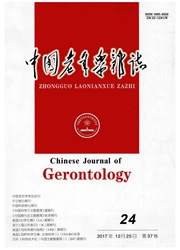

 中文摘要:
中文摘要:
目的从循证医学的角度评价护理干预对中国老年痴呆症患者生活质量的影响。方法通过数据库检索国内外相关文献,并按照事先定义的纳入和排除标准剔除不符合要求的文献,应用Meta分析方法比较实验组和对照组在简易精神状态量表(MMSE)、日常生活能力量表(ADL)中评分方面的差异,以加权均数差(MD)为效应量进行合并分析。结果11篇文献符合纳入标准,MMSE和ADL的合并效应量及95%C1分别为2.93(2.41,3.45)、-1.50(-2.16,-0.84)。结论护理干预可增强中国老年痴呆症患者日常生活能力,改善认知功能,提高生活质量。
 英文摘要:
英文摘要:
Objective To evaluate the impact of nursing intervention on quality of Alzheimer's disease patients' life in China from the perspective of evidence-based medicine. Methods Relevant literatures through the database were searched, and these literatures that did not meet the requirements according to pre-defined inclusion and exclusion criteria were removed. Meta-analysis method was applied to compare the score Status Examination (MMSE), activities of daily living scale (ADL), and the weighted mean difference (MD) was used as effect size for combining analysis. Results 11 studies met the inclusion criteria, the combined effect of the amount of the MMSE and ADL and 95 % CI were 2. 93 (2. 41,3.45 ) , - 1.50 ( - 2. 16, - 0. 84). Conclusions Nursing intervention can enhance Chinese demen-tia patients with activities of daily livings, improve cognitive function and quality of life.
 同期刊论文项目
同期刊论文项目
 同项目期刊论文
同项目期刊论文
 期刊信息
期刊信息
